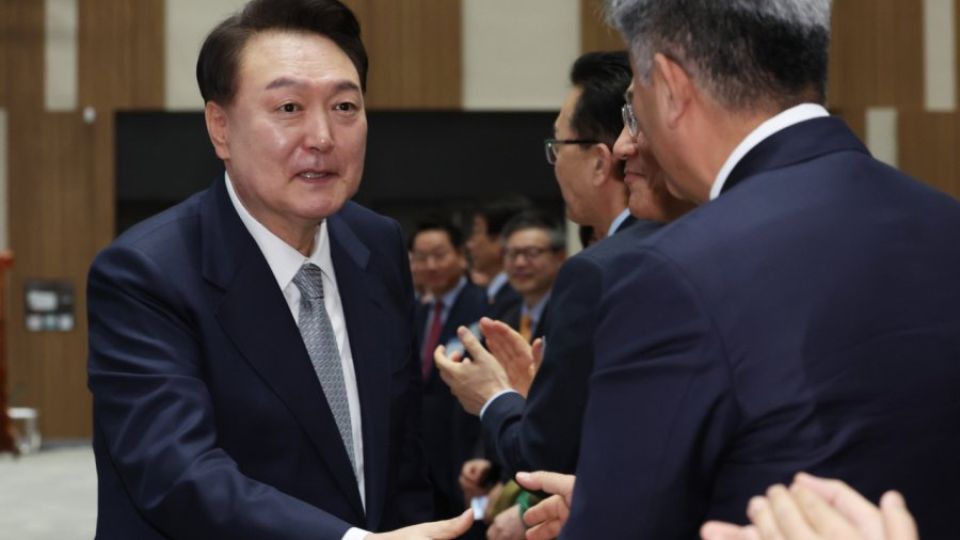March 8, 2024
SEOUL – Construction work for the GTX Line B suburban rail network broke ground in Incheon on Thursday, as the 6.84-trillion-won ($5.14 billion) project aims to connect the port city to Seoul and Gyeonggi Province via express train services.
President Yoon Suk Yeol said the combined population of 13 million people in Incheon and Seoul will enjoy 30-minute commutes once construction of the 82-kilometer railway is complete as planned by 2030.
“The transportation revolution in Incheon has just begun today,” Yoon told some 500 participants in the groundbreaking ceremony held at Songdo Convensia in Incheon.
GTX stands for Great Train Express, with trains running at speeds of up to 180 kilometers per hour. South Korea envisions six lines covering the Greater Seoul Area, as well as potentially parts of Gangwon Province and South Chungcheong Province if an extension of the railway network takes place as Yoon hopes.
Building all six GTX routes would cost the country 38.6 trillion won and would shrink daily commute times to a quarter of what they are currently, the conservative Yoon administration announced earlier in January. The GTX Line B is the third out of six new lines to have broken ground, following the GTX Line A in 2018 and Line C in January.
The travel time from the GTX Line B in Songdo, Incheon to Seoul Station would take 29 minutes. Using the current public transit system, commuters would have to travel at least an hour and a half by subway or two hours by bus.
With the arrival of the GTX Line B, travelers would need 23 minutes to get from Songdo to Yeouido, home to Seoul’s financial district and the National Assembly.
“There was a time when those traveling between Seoul and Incheon for work or school had (long journeys), so they studied or memorized English vocabulary on their way back and forth,” Yoon said during the 18th session of a series of policy debates held in Incheon, just hours before the groundbreaking ceremony.
“This will become a thing of the past. You can listen to a couple of songs and then you will have already reached your destination.”
Travelers on the GTX Line B would be able to transfer to the subway at any of the 14 stations, including Incheon National University Station in Songdo, western Incheon, and Maseok Station in Namyangju, Gyeonggi Province.
In addition to the GTX Line B construction plan, Yoon also laid out his pledge to turn the port city into a ground transportation hub.
Construction to connect different railways will take place before 2027, allowing high-speed KTX trains to run in Incheon so that travel time from Incheon to Busan would shrink to less than three hours. It takes more than four hours for an express bus to run from Incheon to Busan during optimal traffic.
Three out of six GTX lines — the GTX Lines B, D and E — will have stops in Incheon. Seoul Subway Lines No. 5 and No. 7 will be extended further to new Incheon townships like Cheongna International City.
At the GTX Line B groundbreaking ceremony, Yoon added that the long-awaited construction project had been stalled despite its inclusion in a long-term national railway network plan in 2011.
Yoon, who was inaugurated as president in May 2022, announced the launch of the GTX Line B project in January 2023.
“We’ve been through a slew of challenges before the groundbreaking ceremony today,” Yoon said. “But we’ve done everything to keep the promise to Incheon’s citizens. Following 60 meetings for strategy executions … we were able to hold this historic ceremony before the people of Incheon.”
Yoon also hinted at a GTX Line B extension eastward to Gangwon Province, potentially connecting Incheon to Chuncheon, the capital of the eastern province.
Incheon has become a hub for international trade. Since opening in 2001, Incheon Airport has risen to a hub in East Asia that sees some 70 million passengers passing through its terminals and 2.8 million tons of container throughput each year. Incheon also houses a seaport whose cargo throughput reached about 3.4 million twenty-foot equivalent units of containers.
Yoon said during the policy debate that Incheon Airport’s expansion of Terminal 2 and the addition of a fourth runway will proceed as planned, and are set for completion before the end of 2024.
Meanwhile, a high-tech aviation complex will open by 2026 with the expectation of generating more than 5,000 jobs and producing over 10 trillion won in revenue in the next 10 years, Yoon said.


